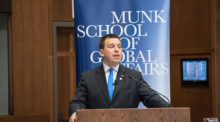Joseph Hawker
Whether transforming the lives of its citizens through technological innovation or strengthening crucial global alliances, Estonia leads the way in Europe, and increasingly views international partners like Canada – and the University of Toronto – as key players in its future.
Estonian Prime Minister Jüri Ratas highlighted the importance of international cooperation during a public address at the Munk School of Global Affairs on May 25. In his remarks, the prime minister illustrated Estonia’s long record of achievement in digitalization of governance and called for continued collaboration with other countries in areas ranging from national security to artificial intelligence, to the protection of personal data. Ratas spoke to an audience of 140 people, with an especially enthusiastic turnout from Toronto’s Estonian diaspora community.
Professor Randall Hansen, interim director of the Munk School, welcomed the prime minister by highlighting several of Estonia’s considerable strengths. “Having emerged since 1989 as a thriving democracy and full member of the European Union, Estonia has developed a robust civil society, has become a leader in cybersecurity and digital governance, and can be justly proud of being the Baltic leader in recognizing the rights of LGBTQ people,” said Hansen.
Digitalization of everyday life is Estonia’s signature interest: Estonians make 99.8% of their banking transfers online, and 96% of the country’s citizens submit their income-tax declarations electronically (within an average of three minutes). Other common tasks – from communicating with physicians to checking children’s grades – can all be accomplished on secure digital platforms.
An important element in Estonia’s digital success story, Ratas emphasized, has been the nation’s willingness to trust the government with their data. For example, even after the government discovered (and remedied) a vulnerability in the country’s national ID cards in 2017, Estonians continued using the cards without hesitation. Ratas explained that just one month after the vulnerability was discovered, almost a third of Estonians cast their ballots online in the local elections, demonstrating “the continuing trust of people.”
Estonia’s digital economy contributes to what the prime minister referred to as a “hassle-free society” in which interactions between citizens and government are streamlined to the greatest extent possible.
Protecting the societies in which such open innovation takes place, however, remains a key concern, particularly in view of geopolitical challenges posed, for example, by growing Russian aggression.
On this point, Ratas emphasized that strong transatlantic relations offer the “greatest guarantee of security” for countries like Estonia. He expressed his gratitude to Canada for its active participation in NATO’s Enhanced Forward Presence in eastern Europe by leading a battlegroup based in Estonia’s southern neighbour, Latvia. NATO, for all its members, remains the “cornerstone of collective defence.”
Looking forward, Ratas touched on the common interest of Estonia and Canada in staying at the forefront of developments in fields such as artificial intelligence. He commended U of T for its leading role in research and innovation in this field and praised Professor Emeritus Geoffrey Hinton’s work in the area of deep learning.
The opportunities generated by such technology, however, must be balanced against possible adverse outcomes, including compromises to privacy and personal data. It should remain a priority of innovators, Ratas said, to remember that technology must exist in service of citizens and commerce, not in place of them.
“In all of these areas,” he said, “Estonia, Canada, and U of T stand side by side, looking straight into the future.”
May 29, 2018
